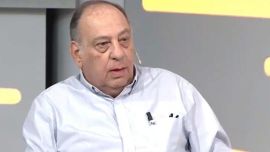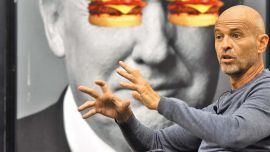Argentina will go to the ballot box next week with inflation running at its fastest pace in three decades.
Just over a week out from the October 22 presidential election, the INDEC national statistics bureau revealed Thursday that consumer prices have risen by more than 100 percent since the turn of the year and by 138.3 percent over the last 12 months.
Inflation accelerated in September to 12.7 percent, reported the bureau, the second consecutive double-digit hike after the 12.4 percent recorded in August and the highest monthly rate in three decades.
The cost of living in the first nine months of 2023 has risen 103.2 percent, with a quarter of the year still to go.
INDEC’s report indicates that inflation is accelerating and at its highest pace since the 27 percent recorded February 1991 prior to the introduction of the convertibility plan.
The news came just days after Argentina's beleaguered peso tumbled to new lows against the dollar on the informal market as citizens scramble to ditch the peso amid anxiety over what the election will bring.
"The division with the highest increase in the month was clothing and footwear (15.7 percent), driven by the change of season. It was followed by recreation and culture (15.1 percent) – mainly due to the rise in cable television services – and food and non-alcoholic beverages (14.3 percent)," said INDEC in its report.
Highlighting the challenges facing consumers in affording everyday essentials, the bureau found that meat and derivatives rose 15.9 percent in September, with bread and cereals up 12.7 percent and fruits soaring 25.6 percent. Bananas were up a whopping 46.2 percent.
By contrast, the only categories that remained below double digits in September were education (8.1 percent), housing, water, electricity and other fuels (8.5 percent), healthcare (9.5 percent) and communication (9.6 percent).
Broken down by type of product, INDEC said that goods soared 13.5 percent while services rose 10.5 percent.
Price hikes were most extortionate in Patagonia, rising 13 percent, with Greater Buenos Aires given the most relief with a below-average 12.2 percent. Food and drink rose 17,5 percent in the southern region alone.
Most analysts had forecast that last month’s inflation rate topped 11 percent, though not necessarily that it had accelerated.
Chief economist of the Fundación Libertad y Progreso think-tank, Eugenio Marí, predicted a rate of 11 percent, noting that Argentina had not recorded two consecutive months of double-digit inflation for more than three decades.
"You have to go back to the two-month period February-March 1991 to find another two consecutive months with double-digit monthly inflation," observed the specialist.
Economist Claudio Caprarulo, director of the consulting firm Analytica, estimated that prices rose 12.1 percent.
A report published earlier this week by the Institute of Workers' Statistics (IET) of the Metropolitan University for Education and Work (UMET) and the Centre for Consultation and Development (CCD) revealed that inflation for workers reached 11.5 percent in September.
"If inflation averaged 10 per cent a month in the remaining three months of the year, the cumulative figure for 2023 would be 167.1 percent," the report said.
August's devaluation of the peso, in the wake of the PASO primaries, contributed to the high rate of inflation in September, according to economist Federico Zirulnik of the Scalabrini Ortiz Centre for Economic and Social Studies.
"As the devaluation took place in the middle of the month, there was still more or less half of the impact of that devaluation that was going to be passed on to September prices. Statistically, this is what is called the drag effect," said the expert.
Regarding the risk of hyperinflation, Zirulnik said: "We are now stabilised with high inflation, but stabilised at 12 [ercemt per month. If we were facing hyperinflation, last month it would have been 12 percent, this month 15 percent or 20 percent, and next month 25 percent. That's the difference."
"If the government manages to sustain the official exchange rate, perhaps in October we will be below this inflationary index of 12 percent. If not, we could continue to climb up the ladder and at some point we could hit hyperinflation," warned Zirulnik.
This is the last publication of official data before Argentina goes to the polls for a general election on October 22. Outsider libertarian candidate Javier Milei is the frontrunner after winning the most votes in the PASO primaries back in August.
His main rivals are opposition coalition leader Patricia Bullrich and the presidential candidate for the ruling Unión por la Patria coalition, Economy Minister Sergio Massa.
Argentines are already struggling to make ends meet, with about 40 percent of the population living in poverty as the nation reels from the latest in a long line of economic crises.
Massa has also been accused of worsening Argentina's crisis by going on a spending spree to lure voters and further fuelling inflation. In recent weeks he has eliminated income tax for some 800,000 citizens, removed VAT levies from basic goods, and is making cash payouts to millions of informal workers.
Analysts say whoever wins the election faces an uphill battle to achieve what no previous government could: restoring fiscal discipline in the heavily indebted country, where millions rely on welfare, and which has a penchant for printing money to finance its overspending.
– TIMES/NA/PERFIL/AFP


























Comments